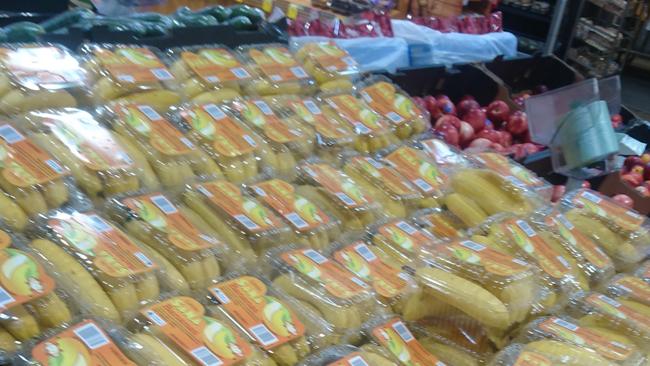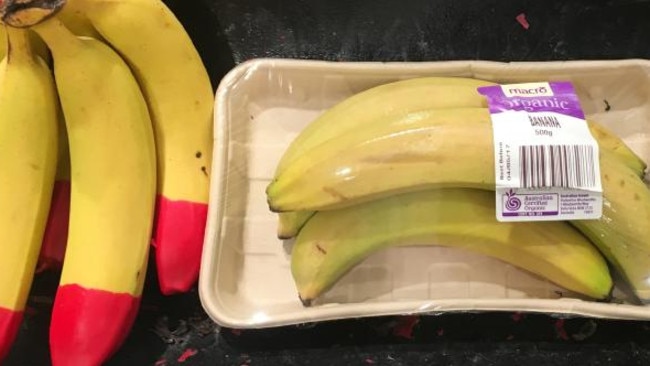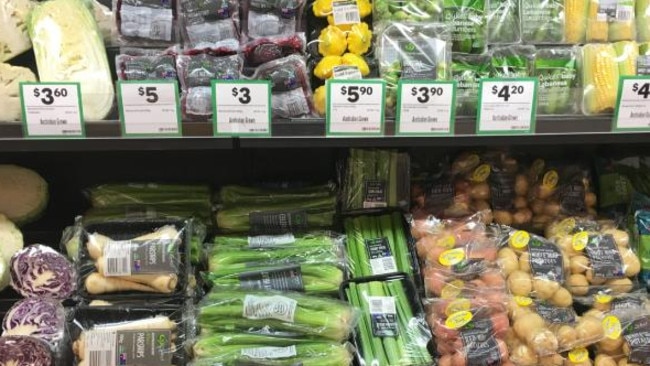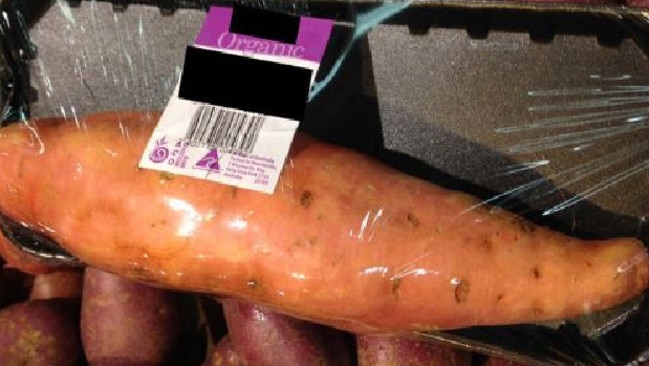Woolworths says customers prefer ‘prepacked bananas’
WHEN a customer uploaded a picture of bananas it sparked a fierce online debate. But Woolies reckons customers prefer it.
WHEN a simple picture of bananas in a Woolworths fruit aisle surfaced online, hundreds of social media users couldn’t believe what they were seeing.
“Bananas now need packaging it seems,” remarked the photo’s uploader on Reddit before comments streamed in, accusing the supermarket of being wasteful with plastic and forcing customers to buy more bananas than they need.
The image from an unspecified Woolworths in Queensland shows an aisle with hundreds of bananas bundled together in plastic cartons.
However, the supermarket has hit back at the criticism today — saying customers actually prefer “prepacked bananas”.
Some online commenters disagreed though, saying they felt it was a ploy to sell more bananas.

“They’re doing it to effectively create a ‘minimum purchase volume’, one social media commenter wrote, “Because people like me only buy two and they don’t want that.”
“That’s because if you leave them as is people will only take the amount of bananas they want,” wrote another Reddit user. “This way if they come in packs of 5 and you need 6 you have to buy 10.”
“It’s to force customers to buy in awkward sizes,” one person said.
‘Woolies (and Coles) would have been collecting the information on how many bananas most people buy per transaction, and they’ll pack them just under that number, forcing you to choose to buy two packs or go without.”

A spokeswoman for Woolworths told news.com.au that the prepacked bananas are only available in Queensland stores and the method is used to package bananas that are different sizes together in one carton. She claimed that this was ideal for families.
“Prepacked bananas are available because some of our customers who are looking for convenience prefer the ability to pick up a prepacked product which meets the needs of their family at a consistent price,” she said.

However, the packaging technique was also slammed by environmentally-conscious Reddit users who believed it was a collosal waste of plastic.
“I hate that,” said one commenter. “They come already pre-packaged by nature.”
“The world’s usage of plastic is completely out of control, and our recycling systems just aren’t keeping up. Already we have a massive issue with recycling,” said another.
“Elsewhere in the world they are banning plastic. France is banning plastic cups and plates. Kenya just banned plastic bags. And we’re wrapping f***ing bananas.”
The Woolworths spokeswoman told news.com.au that it made efforts to use its packaging as efficiently as possible.
“The majority of our produce is not packaged and since July 2017 we will have reduced plastic in produce by over 100 tonnes,” she said.
“Pre-packaged bananas also allows us to take more bananas of different shapes and sizes from the farmer which assists in minimising waste at the start of the supply chain.”
It comes amid a big debate about food packaging in Australia. Every state except NSW has vowed to ban the use of single-use plastic bags however, much of the food we see on supermarket aisles is still wrapped in plastic.
For Pat Lowe, from Broome, it was a single sweet potato that was the last straw. The vegetable was wrapped in plastic and dumped on a styrofoam tray in her local Woolies so she took a picture and started a petition.

It calls for supermarkets to stop wrapping small portions of herbs, vegetables and fruit in plastic and styrofoam. It has now attracted more than 251,000 signatures.
“The world is overloaded with plastic,” she wrote. “Consumption of disposable plastic is a major contributor to plastic pollution.
“These items may be used for a day, or just a minute, but remain in the world forever — plastic does not disintegrate. Wrapping fresh food in plastic is an unnecessary use of non-biodegradable materials, which is leading to the proliferation of harmful waste, much of which is ending up in our oceans.”
However, Coles previously revealed the reason why fruit and vegetables are so heavily packaged in its stores.
Coles said it was to “allow differentiation between organic products and conventional products — so that our customers receive what they pay for”.
What that means is that without the wrap — and the “organic” sticker on the wrap — checkout staff could accidentally ring up the produce at the lower non-organic price. And, of course, unscrupulous shoppers could also pass of organics as cheaper at the self-serve registers.
— With Benedict Brook




